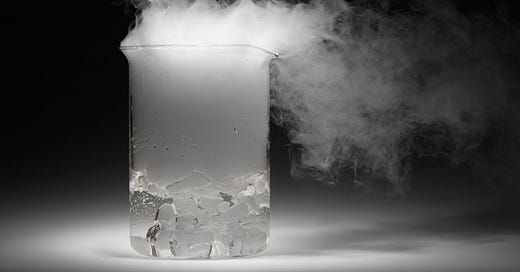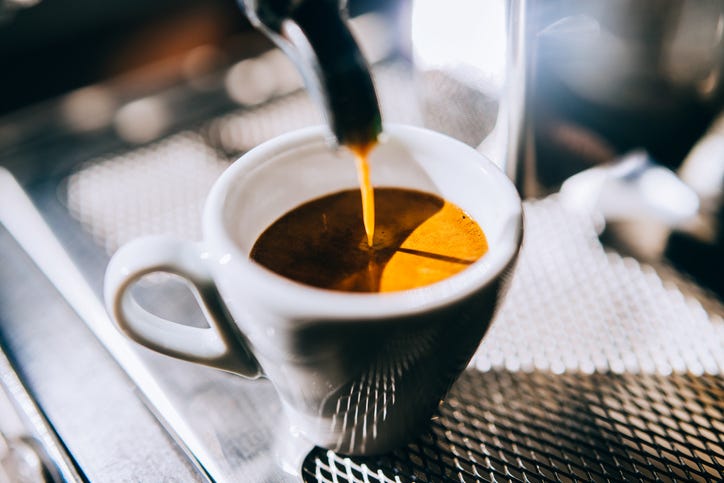Friends,
We took a bit of a break from this series for the month of May to write poems together, and in June, I caught my breath. I’m excited to jump back into our Somebody That I Used to Know series with this piece I wrote years ago called A Chemical Reaction of the Soul.
It’s just a fun, creative read, and I remember feeling so much the passion of what words can mean when I wrote it. My early days of blogging were punctuated by chasing toddlers around and smelling the coffee brewing at the coffee shop where my partner Travis worked.
Writing then was different—less stressful, maybe, but no less curious than the journey is today. So, here’s the piece, and as always, the bold words are my current self interacting with my past self.
Hope you enjoy!
A Chemical Reaction of the Soul
I’ll be the first to admit that I know little about chemistry.
But recently I had a conversation with my son about chemical reactions, how something as simple as baking a cake becomes a chemical reaction–because the cake can never go back to being flour, salt, sugar, or eggs. It has transformed.
Neither can my coffee, that is ground and immersed in water inside the coffee maker, go back to being the original bean again.
I’ve been thinking a lot about the process of deconstructing or decolonizing my faith.
If you’ve read my book, Native, you know that I frame this conversation of decolonization through an everyday lens, a choice we make to disrupt the status quo of colonialism that is constantly around us.
When I first began writing and published my first book, Glory Happening, I was just starting my deconstruction journey, which naturally led me to deeper questions of what colonization has done to so many of us and how we move forward from here.
About two years ago I had a conversation with a friend that ended in the realization that I am no longer the person I was in high school and college.
My perspectives on faith and the church have shifted, along with who I believe should be included and excluded in such matters. Since then, I’ve left the institutional church, and have conversations with others who have done the same. What will it take for especially majority white churches to recognize the complicity in colonization over the years?
I often travel and speak to those churches, and the reality is, the church really needs to transform, to become something (or somebody) else, and never look back, except to learn from our mistakes and make sure we don’t repeat the oppression we’ve historically enacted on others. Otherwise, too many of us will continue to leave, and we will find healing in spaces that have nothing to do with the faiths we were raised in.
It seems I’ve become someone else over the years, but still hold in tact the original essence of who I’ve always been.
Is it possible to have a sort of chemical reaction of the soul? Is it possible that we transform so that we cannot be what we once were?
I believe that’s a healthier version of ourselves, and if we’re really honest, fighting against transformation will leave us unhappy, missing out on new aspects of ourselves that are waiting to be discovered.
When we refuse to change, to evolve, to transform, we become stuck in only what we’ve known, because we’re scared to ask questions. But the question-asking, the wondering and wandering– it’s what helps those chemical reactions of the soul take place. All of those substances combine in us to bring transformation.
My coffee, steaming in my cup with cream and sugar, will never be a coffee bean again.
It has some sort of new purpose.
Just the same, my life journey today, embracing my Potawatomi identity and asking the American church how it can be better, is a version of myself that cannot forget what it has seen or go back to what it once was.
If coffee transforms, so can we.
And each fall leaf,
every flower,
every bird’s egg that hatches,
each child that grows and matures,
a caterpillar that will become a butterfly,
every pumpkin pie or fortune cookie or veggie omelet–
a chemical reaction in the world, a transformation.
So if we aren’t who we were yesterday, and we’re not yet transformed into who we’ll be tomorrow, who are we today?
Maybe we simply ARE,
this transforming thing,
the cake that’s still in the oven,
the coffee that’s being ground.
Maybe we’re inside the middle of transformation, where it hurts a little, the caterpillar making its way toward the butterfly.
While we are in this cocoon, dreaming of who we’ll be, working toward it, we acknowledge that this space, right now, is necessary and good in the process, and we cannot skip it.
You and I are in the midst of our chemical reaction of the soul, and we cannot go back now.
The only way is forward,
and into glorious, unknown light.
Iw, amen.
Friends,
Thank you for being here. The Liminality Journal is a space to explore our questions, to ask what it means to be human, and to journey toward wholeness together through poetry and prose.
As a free subscriber, you can check out all the posts in this series by scrolling through past posts!
In August I’m starting a new series for paid subscribers called Questions with Kait: writer’s life series, where I’ll be answering questions and sharing about the writing process! If you’re a writer (or aspire to be one) or know someone who might be interested in this series, please share it!
And if you’re not a paid subscriber, you can become one by clicking the button below—as always, if you can’t afford a subscription, please let me know, and we will help you out.








I love the imagery in this piece. Right now, I'd say I'm a newly emerged butterfly from the cocoon--and my wings are still wet. I'm not sure how long they will take to dry off, so I can fly--but that's okay. The painful process of leaving the enclosed space is over and I'm excited to see where I fly to and who I will meet.
Have you ever thought about making any of your work into prints? I'd love to own some for my walls.
Oof, Kaitlin! Yes. Alex and I have been talking endlessly these last several weeks about the many big and small ways we have alchemized over the years... How we've stayed the same just because it is who we have been, how we've come to a point of disruption, how we've made changes because we cannot stay the same, how we've looked back in disbelief that we ever were who we once were - not with judgment so much as distance and hindsight. I think there have been two catalysts for me... hope and despair. And if I'm honest, despair has been more important in my transubstantiation than has hope. Despair compels me to change something so life can be livable again. And, as a fellow former participant in American Christianity, god, I don't know. I have to wonder - will an institution with this much power ever truly despair? And if not, will it ever change?